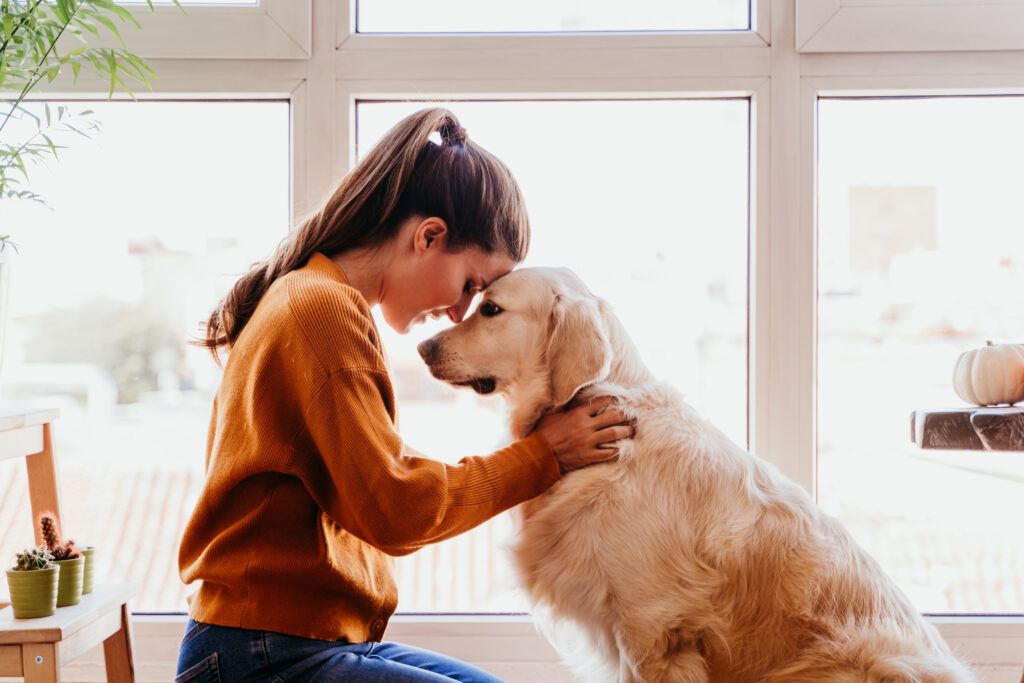Petcover attends Helping Paws Adoption Days
Petcover had an amazing time attending Helping Paws Adoption Days
Read more24 September 2024
Mental health is essential to our overall well-being, and finding ways to nurture it can make a world of difference. While therapy, mindfulness, and staying active are common approaches, one often overlooked source of emotional support and wellness is the companionship of pets. Whether you’re a dog lover or cat enthusiast or prefer more exotic animals, the bond we share with pets can be deeply therapeutic and uplifting.
Let’s explore how pets can have a positive impact on mental health.
Pets offer unconditional love, making them a fantastic source of comfort, especially during tough times. Whether it’s a wagging tail that greets you at the door or the soft purring of a cat curled up beside you, their presence can bring immense joy and ease feelings of loneliness. This companionship helps to combat social isolation, a key contributor to poor mental health.
Spending time with pets has been shown to reduce cortisol levels, the hormone linked to stress. The simple act of patting a pet can also lower your blood pressure, providing physical and emotional relaxation. Stroking a dog or feeling the gentle vibrations of a cat’s purr can offer a soothing, calming effect that helps alleviate anxiety and bring you back into a calm state. Pets can also help manage anxiety by acting as distractions, pulling you into the present moment and reducing the weight of worrying thoughts.
Pets, particularly dogs, encourage us to stay active. Regular walks, playtime, and outdoor adventures increase the amount of exercise we get, releasing endorphins and boosting our mood. Engaging with pets in physical activities can be a natural way to combat symptoms of depression or anxiety, providing a sense of purpose and routine.

Having a pet establishes a daily routine that can be grounding for people struggling with mental health issues. The responsibility of feeding, grooming, and caring for an animal creates structure and gives people a reason to get out of bed each day. Routines are vital for creating stability, especially during times of uncertainty or emotional distress.
Pets can also serve as social bridges, helping people connect with others. Dog owners, for instance, often find themselves in conversations with fellow dog walkers or at pet-friendly events, fostering community and shared experiences. For individuals with social anxiety or depression, pets provide a way to engage socially without feeling overwhelmed.
Pets are known for their ability to pick up on their owner’s emotional cues. They often respond to sadness or stress with comforting behaviours, like sitting beside you or nuzzling closer. This emotional intelligence can be incredibly therapeutic, as pets offer silent, nonjudgmental support, helping you feel understood without needing words.

Caring for a pet brings a sense of accomplishment and boosts self-worth. Meeting their needs fosters a sense of responsibility and achievement, which can help counter feelings of inadequacy. For people dealing with mental health challenges, taking care of a pet can be empowering, providing a reminder that they are capable and needed.
Beyond everyday companionship, some animals are trained to help people cope with mental health issues. Therapy animals provide comfort in hospitals, nursing homes, and disaster zones, while emotional support animals assist individuals with conditions like PTSD, anxiety, or depression. The mere presence of a therapy pet can reduce fear, isolation, and anxiety, creating a sense of calm and safety.

Pets can help promote mindfulness—being present in the moment without judgment and engaging with your pet forces you to focus on the here and now, whether throwing a ball for your dog or watching your cat play with a toy. This presence helps reduce mental clutter and overthinking, allowing you to enjoy small, positive moments in everyday life.
Whether you already have a pet or are thinking about welcoming one, their positive impact on mental health is undeniable. From providing emotional support to promoting physical activity and routine, pets are genuine companions. While they might not replace professional care, their love and joy can be essential to maintaining good mental health.
During Mental Health Awareness Week, take time to appreciate the pets in your life—or consider how adopting one could benefit your well-being and theirs. To seek help or support, visit The Mental Health Foundation of New Zealand website.